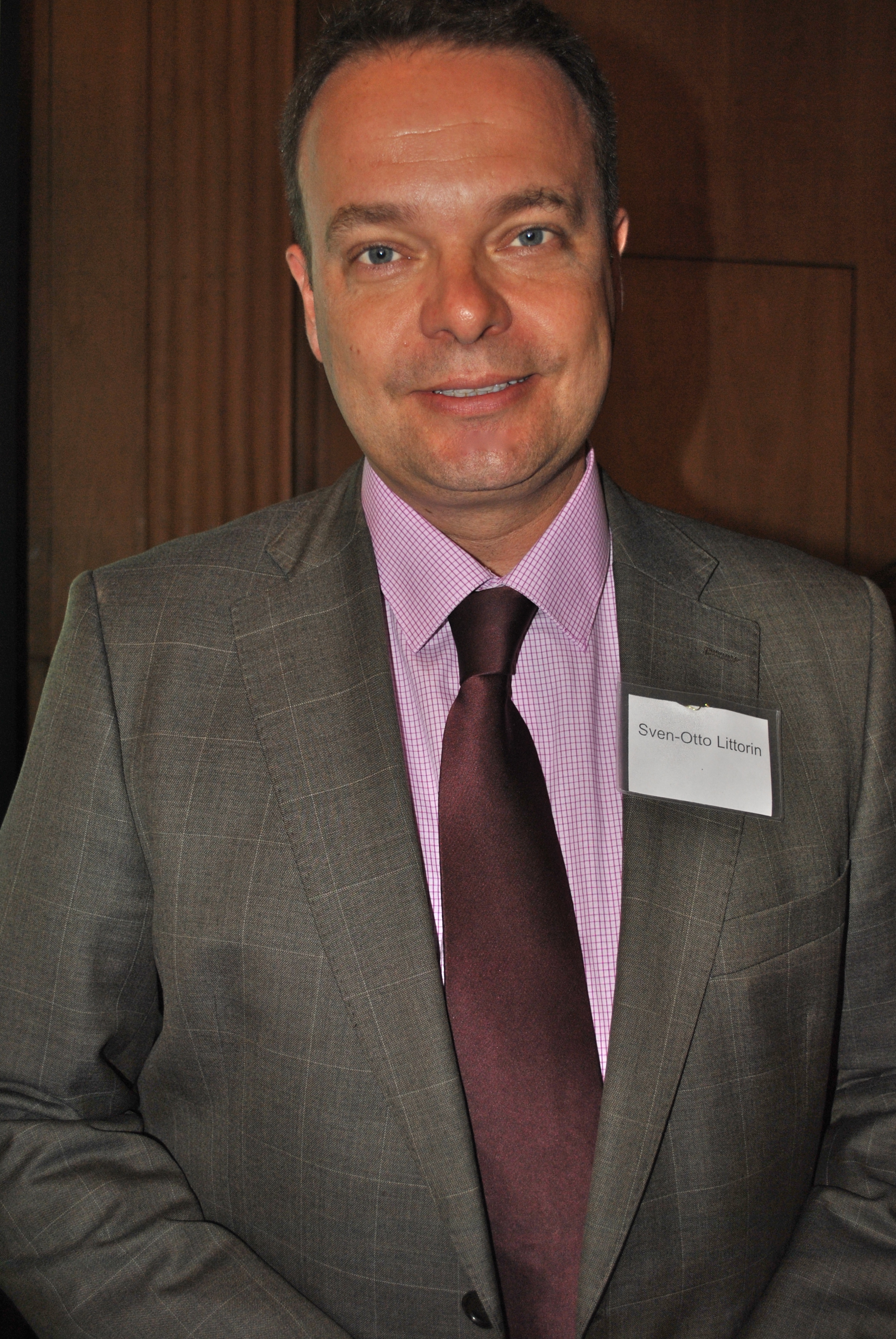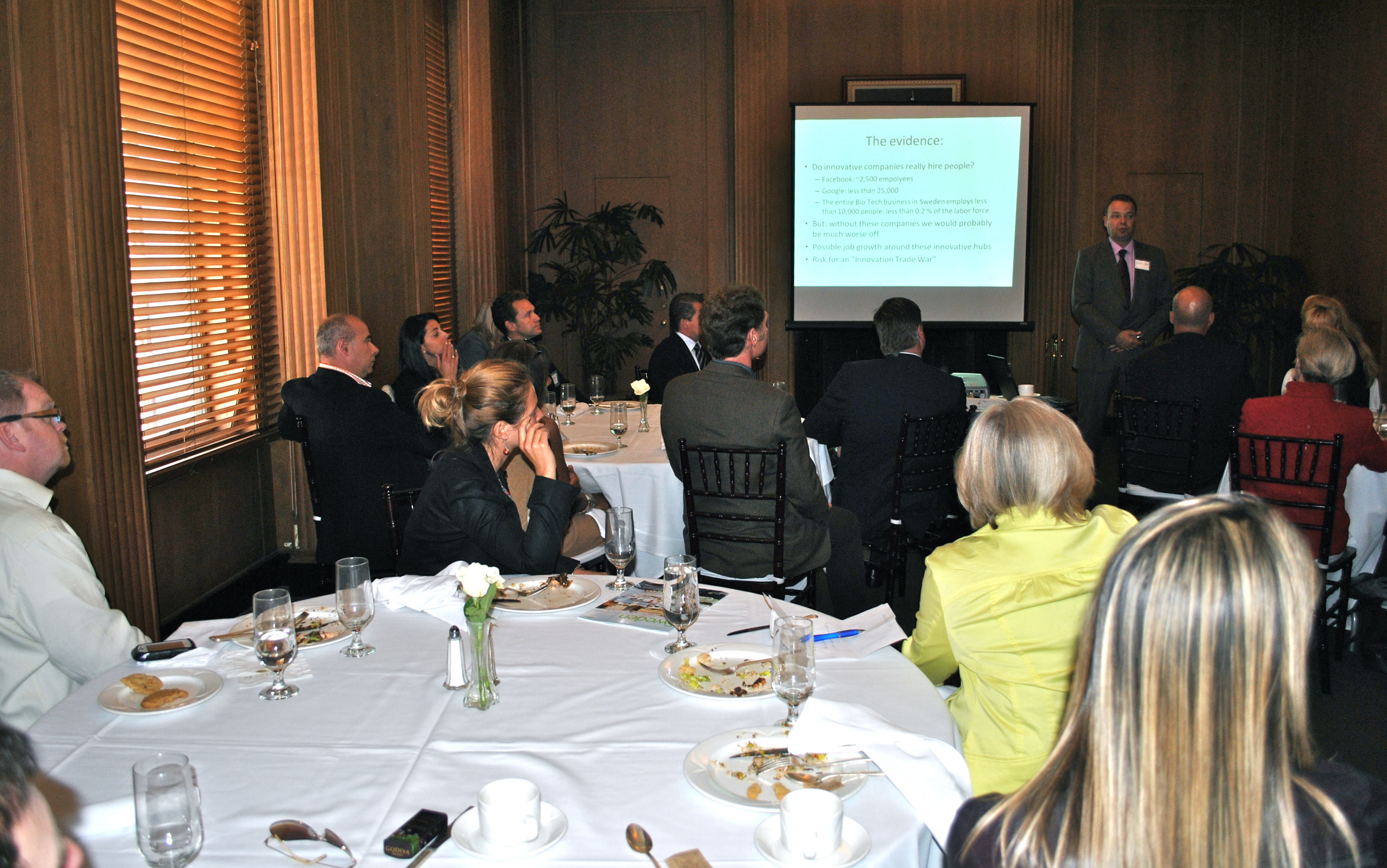Innovation and job creation.
Californian Swedish perspectives on the troubled economy, the links between innovation and job creation and common difficulties facing the U.S. and Europe.
-
 The former Swedish Minister of Employment, Sven Otto Littorin talks about job creation.
The former Swedish Minister of Employment, Sven Otto Littorin talks about job creation. -
-
On April 28, SACC SF/SV had the honor of presenting Sven Otto Littorin as the guest speaker at April’s monthly luncheon. Littorin is the former Swedish Minister of Employment. He was in charge of some major policy reforms introduced in 2006-2010 during one of the worst financial crises that Sweden has ever experienced. As a president of the EU Council of Ministers in 2009, he oversaw the European Union response to labor market effects caused by the financial crisis of 2008-09. The purpose of the luncheon was to give the audience some perspective on the troubled economy, discuss the link between innovation and job creation, as well as policy implications and the difficulties policy makers face in the U.S and Europe.
-
 April's luncheon attendees.
April's luncheon attendees. -
-
By: Katarina Bennich
-
 Littorin is a visiting scholar at Stanford.
Littorin is a visiting scholar at Stanford. -
The luncheon audience got interesting insight into the latest economical turmoil and what key decisions the Swedish government made to turn the economy around. Even though Sweden managed the crisis relatively well, it is not yet over, Littorin told them.
Most countries, he explained, experience slow growth, budget deficits and increasing public debt, imbalances and an exclusion from labor markets. Littorin has a proven recipe for what politicians should do to turn a country around: cut spending, raise taxes and increase labor supply to increase tax revenue. To succeed, a complete reform of the tax, social security, unemployment insurance and pension systems is a necessity—a necessity that has many barriers to overcome.
Sweden and the U.S. are profoundly different and therefore hard to compare when it comes to aspects like economy and politics. The manageable size of Sweden has some clear advantages. For example, to implement changes in a country the size of Sweden is a challenge within reach, which is not always the case in the U.S. In bad financial times, things that used to be beneficial for the U.S. have turned into the opposite. The U.S. is facing some severe problems in both the economy and labor market, Littorin said. -
 Littorin enjoys the beautiful settings at Stanford as well as the constant sun.
Littorin enjoys the beautiful settings at Stanford as well as the constant sun. -
The missing link between innovation and jobs
There is a research gap in economics. Innovative societies fare better and innovation explains 75 percent of the growth and prosperity, but there is no link between innovation and jobs in basic literature and research. Innovation economists do not create jobs and labor economists do not create innovation, Littorin said. It is a political dilemma.
Governments have vertical structures and ministries do not collaborate. Other branches, the media for example, have the same verticals as politics. Consequently, media and government verticals reinforce each other. Littorin realized this during his time in the Swedish government. That is why crossing the traditional verticals of government as well as encouraging discussion and interaction between the policy creation process has become his mission during his stay. Nevertheless, his work here is somewhat more relaxed compared to his former job as the Swedish Minister of Employment. The SACC luncheon was his first reason in months to wear a tie.
Littorin’s first visit to the U.S. changed his view on life and left him longing to return. He spent three years during the 1990s stationed in New York as the senior vice president of the public relations firm Kreab. He was also involved in SACC-USA where he wrote newsletters, among other things. He is happy to be back in the U.S. and aims for a longer stay than the six months that are planned.
This time Littorin is a visiting scholar at the Center for Innovation and Communication at Stanford. He describes his days as fulfilling, packed with interesting meetings, networking and planning of conferences, like the upcoming IJ-8, the Eighth Conference on Innovation Journalism. He is amazed by the enormous range of lectures and events going on at Stanford and is thrilled to be in this center of intellectualism.
Per capita, Sweden has the most patents and prominent innovators when it comes to both the market and products, which IKEA, H&M and Ericsson have shown. But today's market has too many obstacles when growing from a small to a large company, mostly due to a lack of investors. People of success in Sweden often end up at international corporations. That way, all of that knowledge leaves the Swedish market and its smaller companies. Despite that, Littorin stays positive, and he certifies that Sweden has all of what it takes to get out of the crisis. -
The Holy Grail of politics
To increase the status of innovation, quantifiable ways of measuring how innovation supports job growth has to be developed. Littorin says that innovation has become the Holy Grail of politics.
"Every clever politician is aiming to be an apostle of Innovation," he claims, "as they are trying to come up with new ideas and new policies. The problem is to find the ones that work. Governments will choose policies which work fast and avoid policies that are uncertain or will yield long-term results."
Innovation’s importance for technological growth has come to overshadow its importance for economic growth. The actual innovation hiring revenue presents a darker reality, Littorin reluctantly concludes. Google has less than 25,000 employees and Facebook no more than 2,500. The entire Biotech business in Sweden employs less than 10,000 people, which is less than 0.2 percent of the labor force.
After all, Littorin is keen on highlighting the possible job growth around these innovative hubs, and that without these companies we would probably be much worse off.
Littorin may sound optimistic, but he is well aware there is no quick fix. Innovation is not the only solution, even though it is important and should be supported. Job growth comes from regular companies wanting to hire regular people and there is no real substitute for the service industry and the manufacturing industry.
When it all comes around, not much has changed. The market is dependent on clients and customers—without selling, there is nothing. -
-
